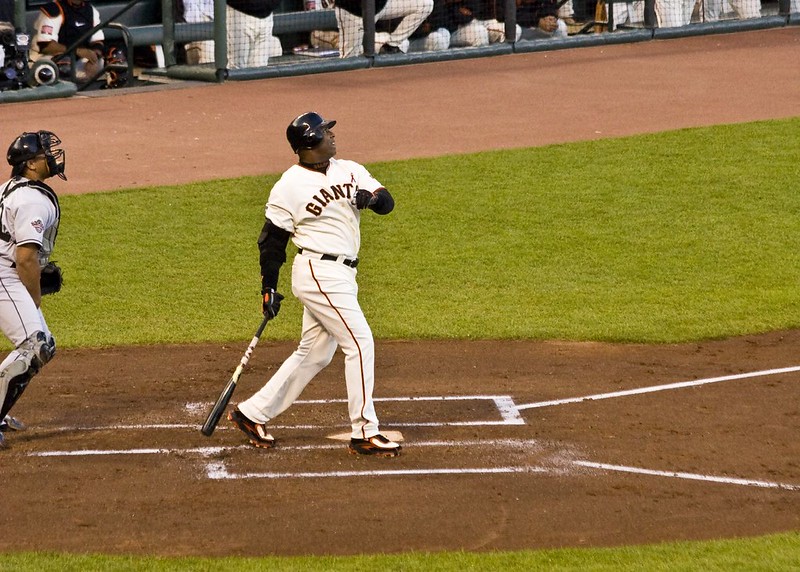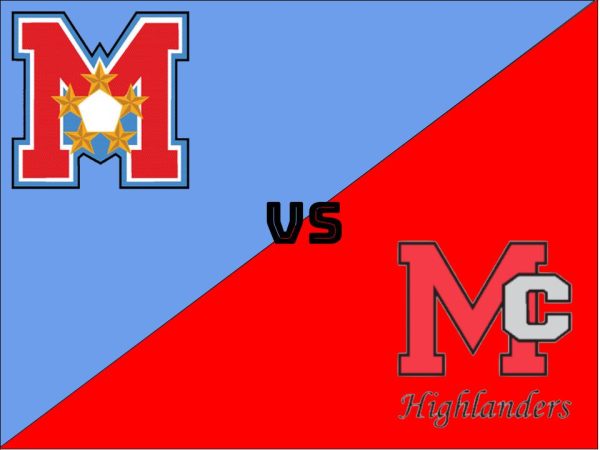The case against Barry Bonds
Why a major league cheater shouldn’t be rewarded
Barry Bonds swings, delivering one into the seats. Although he hit a record setting 762 home runs, his steroid use strips him of this title. (Photo obtained under fair use via Creative Commons license).
June 28, 2020
Over the past few years, Barry Bonds, baseballs all-time home runs leader, has slowly began to build traction towards the Hall of Fame. In 2020, his eighth year of eligibility, Bonds received 60.7% of the vote, which requires 75% for induction. While this reveals that the majority of Hall of Fame voters agree that Bonds deserves to reach the Hall, I disagree.
Taking a look at the numbers, it would seem like a no-brainer that Bonds should be elected. After all, 762 home runs, 514 stolen bases, and a career 182 OPS+ (100 is league average) are video-game like. Those numbers, however, are hideously skewed by multiple years in Bonds’s mid to late thirties where he transformed from a normal person into a hulking baseball god thanks to his little friend named HGH, short for human growth hormone.
From his rookie year in 1986 through his age 32-season in 1997, Barry Bonds was consistently one of the best players in the league. His numbers are eerily similar to the beloved Ken Griffey Jr.’s numbers through his first twelve seasons, who was a no-doubt candidate for the Hall of Fame once he retired. However, in 1998, Bonds, from the advice of his trainer, began to take steroids for the first time.
From 1998 through 2007 (when Bonds was 42), he put up unbelievable numbers. In fact, somehow, Bonds produced even better numbers than he had put up from his first twelve seasons. He hit more home runs, had a higher OPS+, and destroyed single-season walk records with ease.
Compared to the average aging curve of a major leaguer, Bonds would have been at the very tail end of his prime when he began eating a balanced breakfast every morning. Laughing in the face at normal statistics, Bonds went on to earn four consecutive MVPs from the ages of 36-39, the age range where a formerly solid major league player would hope to hang up the cleats. The fact that it took so long for people to think to themselves, “Hm. Maybe this Barry Bonds guy shouldn’t have arms the size of tree trunks in his late thirties” is a travesty.
WAR, or wins above replacement, is a statistic that tries to show how many wins a major league player was worth to their ball club. A WAR of 2.0 is considered league average. The graph above displays the average WAR value from ages 33-39 for major league players (blue) compared to Bonds’s WAR values from 33-39 (red).
As you can see, Bonds’s stats absolutely destroy the laws of baseball physics. This proves how much performance-enhancing drugs aided to Bonds’s career statistics. Thus, you should simply take these numbers with a grain of sand.
What Bonds supporters seem to cling on is that his numbers prior his steroid use were good enough for induction. Sure, they definitely were. If Bonds had retired or fallen off the map like a normal major leaguer, he’d be a no-doubt first ballot hall of famer.
However, what some people can’t seem to grasp is that Bonds must face repercussions for his actions. His punishment? No hall of fame!
It’s not enough to just ignore Bonds’s stats from 1998 on as “punishment.” If I ran an Olympic race with rocket boots and everyone else had on normal shoes, I wouldn’t only be disqualified from the event-I’d be banished from the Olympics for life. That’s how cheating in sports works.
The final argument commonly presented by Bonds supporters is the fact that everyone was on steroids then, so Bonds was only leveling the playing field. For one, saying that “everyone” was on steroids at that time is just plain ignorance. That accusation is nowhere near true.
Also, how does that cancel out Bonds’s act of cheating? If he had stayed steroid-free at that time, he definitely would have put up much lower numbers than he did, probably putting up numbers similar to a typical major leaguer (see above graph).
This statement actually contradicts the notion that Bonds would have made the hall of fame solely based on his numbers from his first twelve seasons; if he was a hall of famer anyway, why would he need to take steroids later in his career? I’ll tell you why. It’s because Barry Bonds is a dirty, stinky cheater who thought he could become the greatest player of all time by way of pumping himself full of chemicals.
It’s definitely true that Barry Bonds was a great baseball player. However, his blatant cheating that tarnished and disrespected the sport he supposedly loved is inexcusable. Barry Bonds will never and should never be enshrined in the Major League Baseball Hall of Fame.













